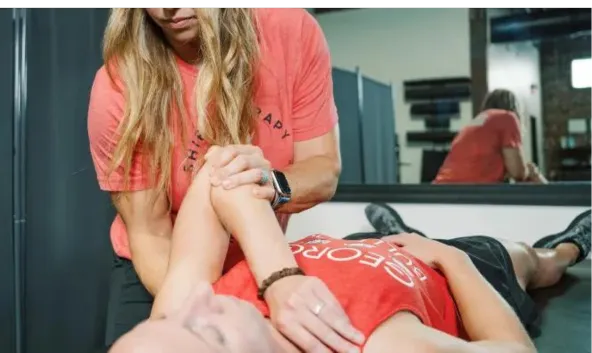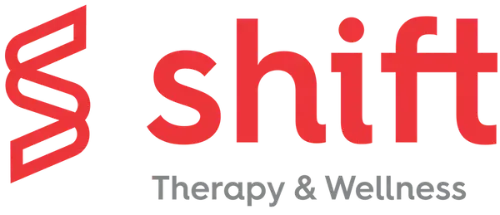Shift Therapy & Wellness
Tennis and Pickleball Injury Treatment in Rome, GA
Expert Tennis & Pickleball Injury Treatment in Rome, GA
Specialized physical therapy for tennis elbow, pickleball elbow, and all common tennis and pickleball injuries in Rome, Georgia

Rome’s Premier Tennis and Pickleball Injury Specialists
Are nagging tennis or pickleball injuries keeping you off the court? At Shift Therapy & Wellness in Rome, GA, we specialize in treating the full spectrum of racquet sport injuries. Led by Dr. Lindsey Bellcase, DPT, GCS, CF-L1, Cert-DN, our evidence-based approach combines advanced manual therapy with sport-specific training to ensure optimal recovery and injury prevention for tennis and pickleball players throughout Northwest Georgia.
Schedule Your Free Tennis/Pickleball Injury Assessment – Call our Rome, GA clinic today to speak with our racquet sport injury specialists.
Meet Dr. Lindsey Bellcase – Your Tennis & Pickleball Injury Expert
Lindsey Bellcase, DPT, GCS, CF-L1, Cert-DN
Owner & Lead Physical Therapist | Athletic Movement Specialist
Dr. Bellcase brings exceptional qualifications to tennis and pickleball injury treatment in Rome, GA:
- Doctorate in Physical Therapy – University of South Alabama (2009), Alpha Eta Honor Society
- Certified Dry Needling (Cert-DN) – Advanced treatment for muscle dysfunction and trigger points
- CrossFit Level 1 Coach (CF-L1) – Understanding of explosive movements and athletic performance
- Former Student Athletic Trainer – Direct experience treating sports-related injuries
- Geriatric Clinical Specialist (GCS) – Expertise treating older athletes returning to racquet sports
As both a healthcare professional and active athlete, Dr. Bellcase understands the physical demands of racquet sports and the importance of returning to play safely and effectively.
Award-Winning Excellence in Rome, GA
- Best of Rome 2024 Winner – Recognized as Rome’s premier physical therapy clinic
- 5-Star Google Rating with over 100 five-star reviews
- 5-Star Facebook Rating from satisfied tennis and pickleball players
- Over 200 Five-Star Reviews from successful sports injury recoveries
Common Tennis and Pickleball Injuries We Treat in Rome, GA
Tennis Elbow (Lateral Epicondylitis) Tennis elbow affects up to 50% of regular players, causing pain on the outside of the elbow during forehand and backhand strokes. Our Rome clinic provides comprehensive tennis elbow treatment including:
- Advanced Dry Needling – Dr. Bellcase’s certification allows targeted trigger point treatment
- Progressive Strengthening – Sport-specific exercises to restore function
- Biomechanical Analysis – Stroke technique evaluation to prevent recurrence
- Equipment Modification Guidance – Racquet and grip adjustments
Pickleball Elbow Treatment Pickleball elbow is increasingly common due to the sport’s rapid growth and unique stroke patterns. Our specialized treatment addresses:
- Repetitive stress from pickleball’s quick exchanges
- Unique biomechanical demands of the pickleball stroke
- Age-related factors common in pickleball players
- Return-to-play strategies specific to pickleball
Shoulder Injuries from Tennis and Pickleball
Rotator Cuff Injuries The powerful overhead serving motions in tennis and pickleball place tremendous stress on your shoulder complex. Our Rome clinic specializes in treating:
Acute Shoulder Conditions:
- Rotator cuff strains and tears
- Shoulder impingement syndrome
- Labral tears from overhead motions
- Acute shoulder pain during serves
Chronic Shoulder Issues:
- Rotator cuff tendinitis
- Scapular dyskinesis (shoulder blade dysfunction)
- Range of motion limitations
- Chronic shoulder pain affecting performance
Treatment Excellence: Dr. Bellcase’s athletic background and manual therapy expertise provide superior outcomes for shoulder injuries in racquet sport athletes.
Knee Injuries from Court Sports
Common Tennis and Pickleball Knee Problems
The quick starts, stops, and directional changes essential to racquet sports create significant stress on knee joints. Our comprehensive knee injury treatment addresses patellar tendinitis, commonly known as “jumper’s knee,” which causes pain below the kneecap from jumping and lunging movements. Meniscus injuries from pivoting and twisting movements are also frequent, along with IT band syndrome causing outside knee pain from lateral court movements. Ligament sprains affecting the MCL and LCL can occur from sudden direction changes, and knee pain from hard court surfaces due to repeated impact is increasingly common among regular players.
Additional Common Tennis and Pickleball Injuries
Beyond the primary elbow, shoulder, and knee conditions, tennis and pickleball players frequently experience lower body injuries including ankle sprains from quick lateral movements and court positioning, achilles tendinitis from explosive court movements and jumping, and calf strains from sudden acceleration and deceleration. Hip flexor strains can develop from serving motions and extensive court coverage, while lower back pain often results from the rotational stresses placed on the spine during play.
Upper body injuries extend beyond tennis elbow and shoulder problems to include wrist pain from racquet impact and grip pressure, forearm strain from repetitive stroke patterns, and neck pain from overhead motions and court positioning. Hand and finger injuries can also occur from racquet grip pressure and unexpected ball impact, particularly in pickleball where the faster exchanges can catch players off guard.
Recognizing Tennis and Pickleball Injury Warning Signs
Upper Body Warning Signs
Tennis and pickleball players should pay close attention to upper body symptoms that may indicate developing injuries. Sharp elbow pain during forehand or backhand strokes often signals the onset of tennis elbow or pickleball elbow, while shoulder pain when serving or reaching overhead can indicate rotator cuff problems. Players may also notice decreased grip strength affecting their racquet control, numbness or tingling in their hand or fingers, or persistent soreness that doesn’t improve with rest between playing sessions.
Lower Body Warning Signs
The explosive movements required in racquet sports can create significant stress on the lower body. Knee pain during quick directional changes is particularly common, along with ankle instability when moving side to side across the court. Hip discomfort that affects your serve stance or lower back pain during rotational movements should also be taken seriously. Many players experience calf tightness or cramping during matches, which can indicate underlying muscle imbalances or overuse patterns.
Performance-Related Symptoms
Sometimes the first signs of injury appear as changes in your game performance rather than obvious pain. Players may find themselves unable to maintain proper form throughout a match, experience decreased power in their serves and shots, or have difficulty with quick reactive movements that were once effortless. Fatigue occurring earlier than usual during play sessions and loss of accuracy in shot placement can also indicate that your body is compensating for an underlying injury or dysfunction.
When to Seek Immediate Treatment
Contact Shift Therapy & Wellness immediately if you experience sharp, sudden pain during specific movements, swelling that doesn’t improve within 24 hours, or restricted range of motion that affects your game. Recurring injuries in the same area and pain that persists beyond normal post-play soreness are also clear indicators that professional evaluation and treatment are needed to prevent more serious complications.
Tennis and Pickleball Injury Prevention in Rome, GA
Dr. Bellcase’s athletic background enables detailed analysis of tennis and pickleball movement patterns to identify potential issues before they become injuries:
- Stroke Mechanics Evaluation – Identifying inefficient patterns causing stress
- Movement Assessment – Optimizing footwork and positioning
- Equipment Setup Analysis – Racquet weight, grip size, and string tension review
- Training Load Management – Balancing play time with recovery
Customized Prevention Programs
Our comprehensive injury prevention approach begins with sport-specific warm-up routines that include dynamic stretching for tennis and pickleball, activation exercises for key muscle groups, movement preparation drills, and court-specific mobility work. These routines are designed to prepare your body for the unique demands of racquet sports and reduce injury risk from the first point of play.
Targeted strengthening programs form the foundation of our prevention strategy, focusing on rotator cuff strengthening for overhead motions, core stability for rotational power, leg strength for effective court coverage, and grip and forearm strengthening to handle the repetitive demands of racquet control. These programs are progressively designed to build resilience in the specific muscle groups most stressed during tennis and pickleball play.
Recovery and maintenance protocols ensure that your body can handle the cumulative stress of regular play. This includes post-play stretching routines tailored to the muscles most used during racquet sports, recovery strategies to implement between matches and practice sessions, comprehensive injury prevention education, and regular movement assessments to catch potential problems before they become injuries.
Frequently Asked Questions About Tennis and Pickleball Injuries
How long will my tennis or pickleball injury recovery take?
Recovery timelines depend on your specific injury severity and adherence to treatment:
Mild Injuries (Minor strains, early tennis/pickleball elbow):
- Initial relief: 1-2 weeks
- Full recovery: 3-6 weeks
- Return to play: 4-8 weeks with proper progression
Moderate Injuries (Tennis elbow, rotator cuff tendinitis):
- Initial relief: 2-3 weeks
- Full recovery: 6-12 weeks
- Return to play: 8-14 weeks with supervised progression
Severe Injuries (Major tears, chronic conditions):
- Initial relief: 3-4 weeks
- Full recovery: 3-6 months
- Return to play: 4-8 months depending on severity
Can I continue playing tennis or pickleball during treatment?
Often, we can modify your playing approach while you heal:
Modified Play Options:
- Adjusted stroke techniques to reduce stress
- Limited play duration and intensity
- Focus on specific, low-stress shot types
- Controlled practice sessions with supervision
Dr. Bellcase will work with you to maintain as much court time as possible while ensuring proper healing.
Will I need to change my tennis or pickleball technique?
Sometimes minor technique adjustments can significantly reduce injury risk and improve performance:
- Stroke mechanics optimization
- Movement pattern improvements
- Equipment setup modifications
- Training intensity adjustments
We recommend changes only when they clearly benefit your game and prevent future injuries.
How can I prevent tennis and pickleball injuries from recurring?
Prevention requires a comprehensive approach that addresses multiple factors contributing to injury risk. Pre-play preparation should include proper warm-up routines specific to racquet sports, dynamic stretching focusing on shoulders, elbows, and legs, movement preparation exercises that mirror court movements, and thorough equipment checks and adjustments to ensure optimal performance.
Training considerations play a crucial role in injury prevention, particularly gradual intensity and duration progression to avoid overuse injuries, balanced strength training designed for tennis and pickleball demands, regular flexibility and mobility work to maintain optimal range of motion, and adequate rest periods between intense sessions to allow for proper recovery and adaptation.
Long-term maintenance strategies ensure sustained injury-free play through regular movement and technique assessments to identify potential problems early, timely equipment updates when needed including racquets, shoes, and strings, proper hydration and nutrition protocols that support recovery, and strict adherence to recovery protocols that allow your body to adapt to training stresses.
What makes tennis and pickleball injuries unique?
These racquet sports create distinctive physical demands:
- Repetitive Overhead Motions – Leading to shoulder and elbow overuse
- Quick Directional Changes – Stressing knees, ankles, and hips
- Explosive Movement Patterns – Requiring dynamic stability and power
- Extended Play Durations – Increasing fatigue-related injury risk
- Court Surface Impact – Affecting lower extremity stress patterns
These factors require specialized treatment approaches that address both immediate symptoms and underlying movement patterns.
Do I need special equipment for rehabilitation?
We provide all necessary equipment for in-clinic treatment. For home exercises, we may recommend:
- Resistance bands for strengthening
- Tennis or pickleball racquet for modified drills
- Foam roller for self-massage
- Light weights for progressive strengthening
- Therapy balls for grip strengthening
Schedule Your Tennis or Pickleball Injury Assessment in Rome, GA
Don’t let injuries keep you from enjoying tennis or pickleball. Contact Shift Therapy & Wellness today to schedule your evaluation and begin your journey back to pain-free play.
Shift Therapy & Wellness is Rome, Georgia’s premier destination for tennis and pickleball injury treatment and prevention. Dr. Lindsey Bellcase and our expert team combine advanced physical therapy techniques with sport-specific knowledge to help racquet sport athletes of all levels achieve their goals safely and effectively. Contact us today to begin your journey back to pain-free tennis and pickleball.

